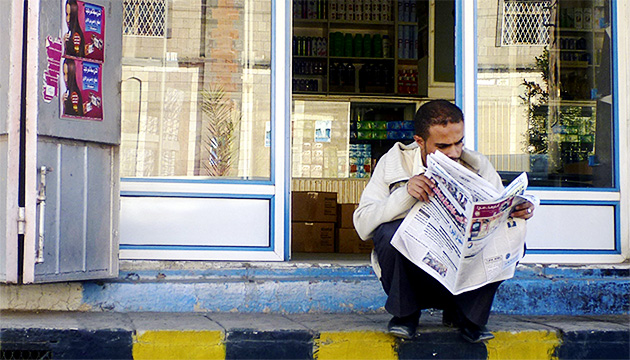
Yemenis are losing faith in their media
While international attention continues to focus on events in other parts of the Arab world, the political transition process in Yemen is facing ongoing and serious challenges. Since the uprising in 2011 that led to the removal of President Ali Abdullah Saleh, his successor Abdu Rabu Mansour Hadi has struggled to keep the country’s transition on track, tested and confronted—often militarily—by a host of political, religious, regional and other groupings.
The latest challenge has come from the Houthi movement. Previously, their rebellion was limited to the northern Saada governorate, but in the course of this year the Houthis have been advancing on the capital, clashing with rivals and organising mass demonstrations. Notably, they have gained national political leverage, not least by protesting issues of common interest, such as increasing fuel prices. Other demands have included a renegotiation of the country’s regions and a new transitional government.
Last month, heavy fighting broke out in parts of Sana’a, primarily between Houthi rebels and supporters of the Islah party, killing more than 270 people and injuring over 500. While a UN-brokered agreement was subsequently signed, many Yemenis fear that larger-scale conflict may lie ahead. The situation in the capital has remained tense since the Houthi takeover, and the fate of the peace deal was called into question when the movement rejected the President’s choice of a new prime minister. On the following day, 9 October, the gravity of the continuing political crisis and the potential for it to escalate was on full and bloody display when a suicide bomb attack against a Houthi demonstration in the centre of Sana’a killed at least 43 people.

Many Yemenis are pessimistic about the direction in which the country is heading. In addition to the threat of conflict, it appears that various political groups are trying to undo or undermine the achievements of the country’s National Dialogue Conference, which ended earlier this year. This could jeopardise the already fragile transition process, including efforts to draft a new constitution and hold elections.
While Yemeni media have long suffered from a lack of objectivity, they have been playing a particularly negative role during the latest conflict, inciting violence and exacerbating differences and disputes. Most outlets are heavily biased and promote the views and agenda of the group with which they are affiliated. This is a rather dangerous trend in an already tense political climate, in which reliable and fact-based information, not propaganda, is required. “Most media are very biased and unprofessional. As an ordinary citizen, it is hard to know the truth. This leads to rumours and creates more conflict,” said journalist, activist, and former diplomat Jamila Raja.
Many people no longer trust the local outlets and are therefore turning to international media such as Al Jazeera or BBC Arabic for news about their country. This is as telling as it is worrying, not least because it could take long to restore confidence in the outlets and journalists that are closest to events and developments on the ground.
There is an urgent need to reverse this unfortunate tendency and try to re-instil a sense of responsibility in Yemeni media. There are different views among freedom of expression activists in Yemen on what approach to take: some believe that efforts should seek to educate and urge journalists (for example through a code of conduct) to produce ethical and balanced content, while others think it would be more effective to ‘name and shame’ those who fail to conform to a certain level of professional standards and ethics. IMS is discussing with its partners various ways to influence media outlets in a positive direction, including its owners, editors, and journalists.
Altogether, the situation in Yemen is arguably the most critical it has been since the turbulent months of 2011. A bright point against this bleak backdrop is the perseverance of IMS’ local partners in Yemen. Despite the difficult circumstances – not least the constantly evolving political and security situation – they remain committed to making a difference and seem intent on carrying on with projects and initiatives aimed at strengthening the moderate voices in the media sector.




